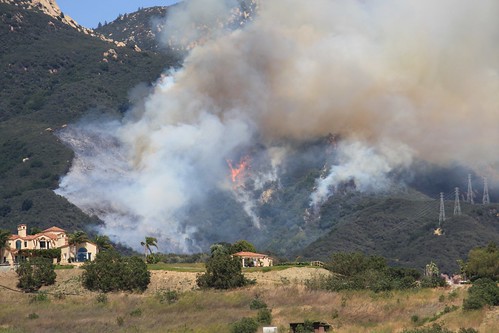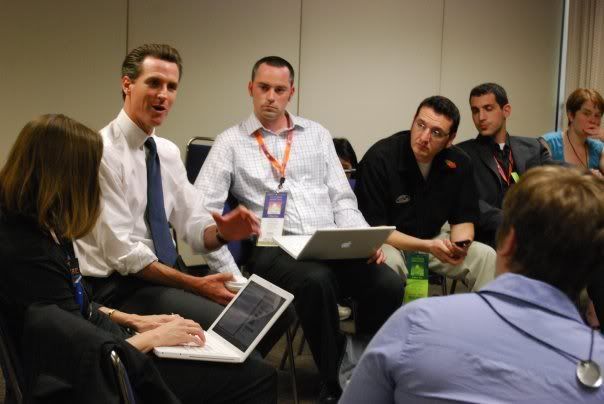In what I have to believe is an intervention to try and save the May 19 initiatives, the Legislative Analyst Mac Taylor is warning of a looming cash crunch:
In a report called “California’s Cash Flow Crisis,” the nonpartisan and independent analyst said state government could be faced with having to borrow a record $20 billion at the start of the fiscal year in order to pay its day-to-day bills.
The report said failure of budget-balancing measures before voters at the May 19 special election “would increase the state’s cash flow pressures substantially – potentially increasing the short-term borrowing requirement to well over $20 billion.”
The article seems to misstate the exact nature of the LAO’s analysis, which actually makes an either/or statement:
Deterioration of the state’s economic and revenue picture (such as the $8 billion revenue shortfall we forecasted in March) or failure of measures in the May 19 special election would increase the state’s cash flow pressures substantially-potentially increasing the short-term borrowing requirement to well over $20 billion. California is likely to have difficulty borrowing anywhere close to the needed amounts from the short-term bond markets based on the state government’s own credit.
The proponents of the May 19 initiatives will likely use this to say “omg you must vote yes or else we are DOOMED!” But that’s not the LAO’s point. What the LAO is saying is that the deterioration we’re already witnessing, with or without the May 19 initiatives, is bad enough to damage our ability to borrow. So why should we cause future budget damage in order to provide a supposed fix in the short-term that won’t actually meet our budget needs?
The LAO says there are really only two options before the state:
• Additional actions to increase revenues or decrease expenditures in order to return the 2009-10 budget to balance.
• Additional actions to delay or defer scheduled payments to schools, local governments, service providers, and others.
Bill Lockyer and Speaker Karen Bass are in DC lobbying Congress to help California by providing guarantees for the all-important Revenue Anticipation Notes that the state uses to generate cash flow. Unfortunately Barney Frank isn’t willing to go down that road:
But Rep. Barney Frank, the Massachusetts Democrat who is chairman of the House Financial Services Committee, has indicated a bill his committee is drafting will not give California officials what they want. Instead, the bill is expected to include a temporary federal “reinsurance” program for state and municipal bonds and notes, as well as requiring bond rating agencies to base ratings on the likelihood of the issuing agency paying off the bondholders. Frank’s committee is slated to take up the bill May 21, two days after the special election here.
The LAO makes the same point I made a few days ago about California getting shock doctrined by the feds the way NYC did 30 years ago and the way nations like Argentina did in the more recent past:
Finally, and perhaps most importantly, we advise the Legislature and other state policymakers to be cautious about accepting any strings that might be attached to federal assistance. Strings attached to recent corporate bailouts-as well as federal loan guarantees provided to New York City during its fiscal crisis three decades ago-have included measures to remove financial and operational autonomy from executives. We recommend that the Legislature agree to no substantial diminishment in the role of California’s elected state leaders. In our opinion, the difficult decisions to balance the state’s budget now are preferable to Californians losing some control over the state’s finances and priorities to federal officials for years to come.
Obviously it depends on whether federal mandates are progressive or regressive – given the neoliberal-friendly nature of this Congress and this White House I am inclined to agree with the LAO that this would not be a desirable outcome.
And yet it shows that until California’s leaders come up with a serious long-term solution, the state will continue to teeter on the edge of the abyss. Only a credible and serious May 20 plan would offer that kind of permanent solution. As I argued before, it should include at a minimum:
• Majority vote budget
• Wealth and corporate taxes
• Reverse corporate tax cuts
• Push repeal of the 2/3rds rule
• Immediate and meaningful prison reform
• Legalization, regulation and taxation of marijuana
In recent days we’ve seen several of these get serious discussion in Sacramento, which is a hopeful sign. But we need to collect them together as a coherent plan and sell them to the voters – instead of selling fear.
As the 2008 election should have proved, fear doesn’t sell. Hope, change, and a plan to put those in action do.

 As if on cue, Mother Nature reminds us that in a dry and fire-prone state such as ours, it is
As if on cue, Mother Nature reminds us that in a dry and fire-prone state such as ours, it is 
 Gavin Newsom sat down with a group of bloggers on Saturday, April 25th at the California Democratic Convention for an hourlong Q&A session. I’ve been a bit slow to write this up, but it was a very valuable conversation that at least for me helped clarify what kind of campaign, and perhaps even what kind of gubernatorial administration, Gavin Newsom will run.
Gavin Newsom sat down with a group of bloggers on Saturday, April 25th at the California Democratic Convention for an hourlong Q&A session. I’ve been a bit slow to write this up, but it was a very valuable conversation that at least for me helped clarify what kind of campaign, and perhaps even what kind of gubernatorial administration, Gavin Newsom will run.